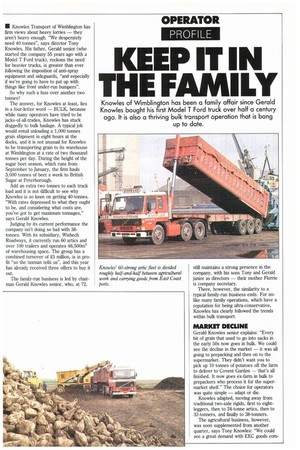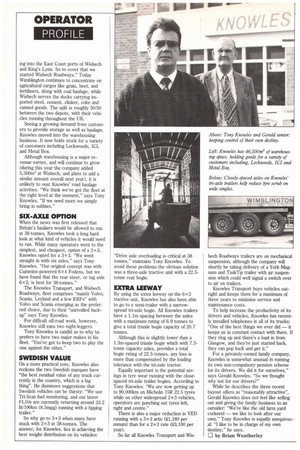KEEP IT IN FAMILY
Page 65

Page 66

If you've noticed an error in this article please click here to report it so we can fix it.
Knowles of Wimblington has been a family affair since Gerald Knowles bought his first Model T Ford truck over half a century ago. It is also a thriving bulk transport operation that is bang up to date.
• Knowles Transport of Wimblington has firm views about heavy lorries — they aren't heavy enough. "We desperately need 40 tonnes", says director Tony Knowles. His father, Gerald senior (who started the company 55 years ago with a Model T Ford truck), reckons the need for heavier trucks, is greater than ever following the imposition of anti-spray equipment and sideguards, "and especially if we're going to have to put up with things like front under-run bumpers".
So why such a fuss over another two tonnes?
The answer, for Knowles at least, lies in a four-letter word — BULK, because while many operators have tried to be jacks-of-all-trades, Knowles has stuck doggedly to bulk haulage. A typical job would entail unloading a 1,000 tonnes grain shipment in eight hours at the docks, and it is not unusual for Knowles to be transporting grain to its warehouse at Winablington at a rate of two thousand tonnes per day. During the height of the sugar beet season, which runs from September to January, the firm hauls 3,000 tonnes of beet a week to British Sugar at Peterborough.
Add an extra two tonnes to each truck load and it is not difficult to see why Knowles is so keen on getting 40-tonnes. "With rates depressed to what they ought to be, and considering what costs are, you've got to get maximum tonnages," says Gerald Knowles.
Judging by its current performance the company isn't doing so bad with 38tonnes. With its subsidiary, Wisbech Roadways, it currently run 60 artics and over 100 trailers and operates 46,500m2 of warehousing space. The group has a combined turnover of £5 million, is in profit "so the taxman tells us", and this year has already received three offers to buy it out.
The family-nin business is led by chairman Gerald Knowles senior, who, at 72, still maintains a strong presence in the company, with his sons Tony and Gerald junior as directors — their mother Florrie is company secretary.
There, however, the similarity to a typical family-run business ends. For unlike many family operations, which have a reputation for being ultra-conservative, Knowles has clearly followed the trends within bulk transport.
MARKET DECLINE
Gerald Knowles senior explains: "Every bit of grain that used to go into sacks in the early 50s now goes in bulk. We could see the decline in the market — it was all going to prepacking and then on to the supermarket. They didn't want you to pick up 10 tonnes of potatoes off the farm to deliver to Covent Garden — that's all finished. It now goes ex-farm in bulk to prepackers who process it for the supermarket shelf." The choice for operators was quite simple — adapt or die.
Knowles adapted, moving away from traditional two-axle rigids, first to eightleggers, then to 24-tonne artics, then to 32-tonners, and finally to 38-tonners.
The agricultural business, however, was soon supplemented from another quarter, says Tony Knowles: "We could see a great demand with EEC goods coin ing into the East Coast ports of Wisbech and King's Lynn. So to cover that we started Wisbech Roadways." Today Wimblington continues to concentrate on agricultural cargos like grain, beet, and fertilisers, along with coal haulage, while Wisbech serves the docks carrying imported steel, cement, clinker, coke and canned goods. The split is roughly 50/50 between the two depots, with their vehicles running throughout the UK.
Seeing a growing demand from customers to provide storage as well as haulage, Knowles moved into the warehousing business. It now holds stock for a variety of customers including Lockwoods, ICI, and Metal Box.
Although warehousing is a major revenue earner, and will continue to grow (during this year the company added 5,500m2 at Wisbech, and plans to add a similar amount overall next year), it is unlikely to oust Knowles' road haulage activities. "We think we've got the fleet at the right level at the moment," says Tony Knowles. "If we need more we simply bring in subbies."
SIX-AXLE OPTION
When the news was first released that Britain's hauliers would be allowed to run at 38-tonnes, Knowles took a long hard look at what kind of vehicles it would need to run. While many operators went to the simplest, and cheapest, option of a 2+3, Knowles opted for a 3+3. "We went straight in with six axles," says Tony Knowles, "Our original concept was with Cummins-powered 6x4 Fodens, but we have found that the rear steer, or tag axle 6x2, is best for 38-tonnes."
The Knowles Transport, and Wisbech Roadways, fleet comprises "mainly Volvo, Scania, Leyland and a few ERFs" with Volvo and Scania emerging as the preferred choice, due to their "unrivalled backup" says Tony Knowles.
For difficult off-road work, however, Knowles still runs two eight-leggers.
Tony Knowles is candid as to why he prefers to have two major makes in his fleet. "You've got to keep two to play the one against the other."
SWEDISH VALUE
On a more practical note, Knowles also reckons the two Swedish marques have "the best residual value of any truck currently in the country, which is a big thing". He dismisses suggestions that Swedish vehicles can be thirsty: "We use Tr-Scan fuel monitoring, and our latest FL1Os are currently returning around 33.2 lit/100km (8.5mpg) running with a tipping trailer."
So why go to 3+3 when many have stuck with 2+3 at 38-tonnes. The answer, for Knowles, lies in achieving the best weight distribution on its vehicles: "Drive axle overloading is critical at 38 tonnes," maintains Tony Knowles. To avoid these problems the obvious solution was a three-axle tractive unit with a 22.5tonne rear bogie.
EXTRA LEEWAY
By using the extra leeway on the 6x2 tractive unit, Knowles has also been able to go to a semi-trailer with a narrowspread tri-axle bogie. All Knowles trailers have a 1.1m spacing between the axles with a maximum rating of 6.9 tonnes to give a total trim& bogie capacity of 20.7 tonnes.
Although this is slightly lower than a 1.3m-spaced triaxle bogie which with 7.5tonne capacity axles, provides a total bogie rating of 22,5 tonnes, any loss is more than compensated by the loading tolerance with the tri-axle tractor.
Equally important is the potential savings in tyre wear running with the closespaced tri-axle trailer bogies. According to Tony Knowles: "We are now getting up to 90,000kna on Michelin 15R 22.5 tyres while on other widespread 2+3 vehicles, operators are punching out tyres left, right and centre."
There is also a major reduction in VED running with a 3+3 artic (21,240 per annum) than for a 2+3 rate (23,100 per year).
So far all Knowles Transport and Wis bech Roadways trailers are on mechanical suspension, although the company will shortly be taking delivery of a York Magnum and TaskTip trailer with air suspension which could well signal a switch over to air on trailers.
Knowles Transport buys vehicles outright and keeps them for a maximum of three years to minimise service and maintenance costs.
To help increase the productivity of its drivers and vehicles, Knowles has recently installed telephones in all of its trucks: "One of the best things we ever did — it keeps us in constant contact with them. If they ring up and there's a load in from Glasgow, and they're just started back, they can pop back and get it."
For a privately-owned family company, Knowles is somewhat unusual in running its own non-compulsory pension scheme for its drivers. We did it for ourselves," says Gerald Knowles. "So we thought why not for our drivers?"
While he describes the three recent buyout offers as "reasonably attractive", Gerald Knowles does not feel like selling out and giving the family business to an outsider: "We're like the old farm yard cockerel — we like to look after our own." Tony Knowles is equally unequivocal: "I like to be in charge of my own destiny," he says.
by Brian Weatherley




































































































